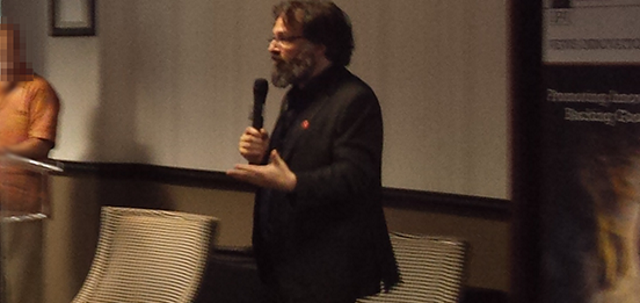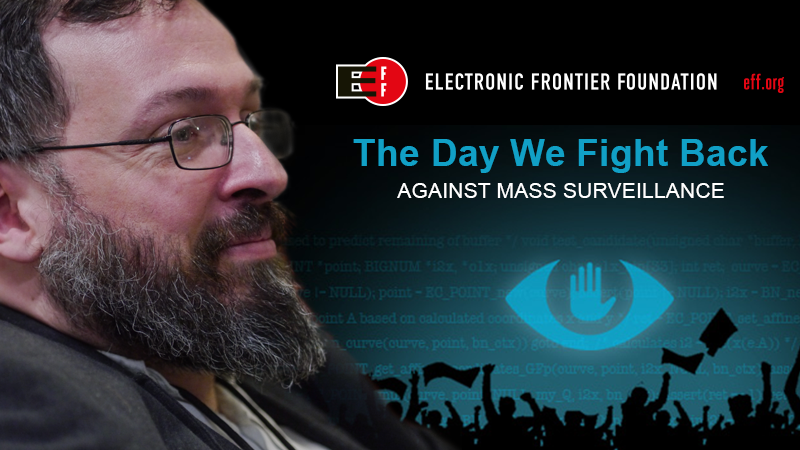Danny O’Brien took up a post as the first international director of the Electronic Frontier Foundation last year. Not to be confused with the fledgling EFF political party begun by the now bankrupt Julius Malema here in South Africa, the US-based EFF has been at the forefront of protecting people’s rights online for nearly 20 years. Balancing a love for technology with a tin-hat approach to personal privacy isn’t easy, and yet the EFF is one of those rare organisations that never seems to put a foot wrong when it comes to acting now to save the future.
This is the second time O’Brien has been employed by the EFF. In between postings he worked for the Campaign to Protect Journalists, regularly visiting African countries to rally support for the free press and raise awareness of those regimes which have grown increasingly repressive over the last few years.
To me, though, O’Brien will always be the witty journalist who co-penned a weekly email newsletter called Need To Know back in the late 90s, which was essential reading for anyone remotely interested in tech, confectionery and Buffy jokes. When O’Brien quit journalism completely to work for the EFF, I realised that he was the kind of principled writer who could act on his convictions that I’d always wanted to be (and never will).
They say you should never meet your heroes, but when I heard he was in Johannesburg to talk to at an International Press Institute gathering last month I quite literally dropped everything and raced over to doorstop him. Fortunately, he’s not only still very funny and can talk the kind of interview you don’t want to edit, he’s also very accommodating. You can download the full, unexpurgated audio interview here, listen to it below, or read the full transcript over the next few pages. We’re publishing it as part of our privacy series around The Day We Fight Back – come along and join us in central Joburg tonight to talk about some of the subjects raised here and more.
htxt.africa: Your new job at the EFF, that’s a completely new role isn’t it?
Danny O’Brien I’ve been at the EFF in this role for a year, I spent three years at the Committee to Protect Journalists before that, but I was actually at the EFF before that. What happened while I was away is that EFF grew two or three times its size and brought in a lot of money, which is why you should always let me leave your organisation. Because that’s what happens when I leave. As soon as I go things start getting better.
When I joined the EFF in 2005, I was actually their only activist. and the, as things have grown and people have become more aware of these digital rights issues, we brought in two or three other activists doing domestic stuff and I became the first international activist.
People have a lot of ideas about what the EFF do, but what we principally do within the United States is something called Public Impact Litigation. Which means we’re a law firm: we have a team of lawyers, and we bring cases or sue people to set precedents that will change how the law is treated in the United States.
The classic thing that everyone knows about because they see it in the West Wing is to take issues up to the Supreme Court, so that they can be judged on constitutional issues. Since 2006, what EFF has been doing is persuing a bunch of cases in the US legal system challenging what we all now know are the NSA’s practices around warrantless wiretapping, not only on all US citizens but also the whole world. The idea behind that is that at some stage a judge will go ‘This is crazy, it’s actually against the law and it’s unconstitutional too’.
That’s what the EFF traditionally does. It doesn’t do a lot of lobbying and it doesn’t do paramilitary manouevres online. We’re not Wikileaks or anything like that. We take cases on.
So the question is, what do you do internationally in that space? For many years, while Cory Doctorow was working for the EFF, we’d go to places like the World Intellectual Property Organisation (WIPO) or various treaty organisations that were trying to export out US copyright law.
[symple_box style=”boxinfo”]
…a company like Google depends on quite a liberal idea of what you can do with material online…
[/symple_box]
US copyright law is actually quite good in a lot of spaces. It’s actually a lot better than in many other countries. In interpretations of things like ‘fair use’ and so on it’s quite liberal. It’s fair to say, for example, that a company like Google depends on quite a liberal idea of what you can do with material online to rearrange and index and organise it wouldn’t be able to do a lot of that outside of the US copyright regime.
However, it’s also a place where Hollywood is, it’s also a place where there’s been a lot of lobbying and they’ve locked down a lot of the copyright regime, the Digital Millennium Copyright Act sucks in a lot of aspects, there have been attempts like SOPA and PIPA and the danger of a bad law passing in the United States is that the US has a lot of influence and incentive to export and get everybody else to sign on to the same copyright laws.

I think that tends to happen informally too. People here in South Africa tend to talk about copyright in US terms, with clauses and definitions that have never featured in our law.
Right – it’s this sort of weird cultural imperialism. People tend to know a lot about American copyright in the same way that they know about American law. Like the SOPA and PIPA thing was a worldwide movement to stop the US passing potential censorship in the name of copyright enforcement.
But at the same time there was another agreement going through in Europe called the Anti-Counterfeiting Trade Agreement – ACTA – which didn’t get the same kind of coverage. But fortunately, because of the publicity SOPA/PIPA generated, EU politicians discovered ACTA in their own back yard and cut that off at the knees.
What I say to people is that you see what’s going on in the US copyright regime partly thanks to organisations like the EFF. But if you actually look in your own country there’s often copyright laws or privacy laws or cyber security laws that are just as bad or worse, but they don’t get the kind of oversight because of scaling issues. A lot of what my team does is to try to provide support in terms of logistics and publicity to activists and organisations in other countiries that are facing this kind of thing, but can’t get on the front page of Reddit as easily.
[symple_box style=”boxnotice”]
Click here for page 2 – Why the US was the Pirate Bay of the seventeeth century
[/symple_box]

